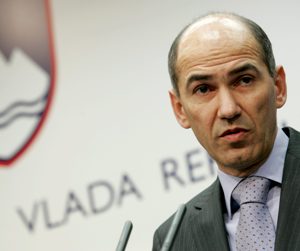The Prime Minister of the Republic of Slovenia, Janez Janša, spoke today at the press conference about the Government’s activities for bolstering the competitiveness and growth of the Slovenian economy as well as for decreasing inflation and its adverse effects. On this occasion the Prime Minister Janez Janša touched upon the issue of the Ecological and Fisheries Protection Zone in the Adriatic, and also answered some other questions of the press.

(Photo: Daniel Novaković/STA)
The Prime Minister said that the governing coalition is open to proposals that may help to increase the competitiveness and economic growth and decrease inflation. Further to the decision on an extraordinary session of the National Assembly to be held upon the proposal of the Government, he said that the Government has already prepared a number of proposals to reduce the negative effects of inflation, which would be discussed at that session. “We need good and realistic proposals. These should be based on an objective evaluation of the situation,” he said, at the same time denying the assertions that recently Slovenia has not made any technological progress. “In the last two years, Slovenia’s export has increased by 16 or 18 percent. Should the Slovenian products be of poor quality, the Slovenian companies could not sell them on the demanding markets. Credits for that go to the highly dynamic Slovenian economy, which has mostly achieved a technological breakthrough in the past few years. Saying else would be unfair to those who have merits for these achievements.”
Regarding the anti-inflation measures, the Prime Minister pointed out the act on employee financial participation, which was adopted by the Government after a prolonged procedure of bringing it in line with social partners. “Thus we responded to one of the claims that have been present in Slovenia for quite some time. Of course, this law will yield its results”, added the Prime Minister. He also expressed his hope that the National Assembly will consider the Government’s proposals and adopt the measures, which would considerably reduce the negative effects of inflation, these being hardest on people with the lowest income. “This refers primarily to an exemption or additional income tax relief for the lowest income class, and a considerable increase in child allowance exceeding 8%”, he added.
The Prime Minister expressed his satisfaction with the fact that recently the work of certain supervisory institutions, especially the Competition Protection Office, has considerably improved. “Earlier there were many deficiencies. The fact is that certain sectors in Slovenia are not sufficiently exposed to competition. Otherwise it could not happen that some Slovenian food products are sold in a neighbouring country at a half price,” opined Prime Minister Janez Janša.
As regards the announced strikes, the Prime Minister believes this is a problem difficult to address with the same measures. He called for a selective approach to such appeals. “Not all demands are equally justified. Some of them are, and this is where the government is sympathetic, too,” he said, adding that any generalizing attitudes towards some accumulated demands may have but negative consequences in the long run. "As regards the demands of trade unions for increased wages in the private sector, the situation differs through companies and branches. There are branches and companies where the demands for increased wages are justified,” stressed the Prime Minister of Slovenia. As regards the demands for increased wages in the public sector, he believes that this is mostly about the dilemma of how the accepted agreement will be implemented in practice without any negative consequences for inflation rise. “The government offered the public sector trade unions a compromise solution. I hope that we will reach a compromise in the next few days when we negotiate about this solution – and without public sector employees being disadvantaged in the long run,” underlined Prime Minister Janez Janša.
As regards the Ecological and Fisheries Protection Zone in the Adriatic, the Prime Minister repeated that the agreement reached in 2004 by common consent and later included in numerous documents of the European Union is acceptable for Slovenia. “Any unilateral violation or abrogation of this agreement or commitments is not acceptable to us. Therefore we insist on what has been agreed. The agreement may be withdrawn from only when the party believing that the agreement is insufficient offers a solution equally acceptable for all parties who reached the agreement,” he stressed and added that such position of Slovenia does not exert any pressure, for it does not concern only the relations between Slovenia and Croatia. “This is the question of the European perspective of the Republic of Croatia and the question of respecting the commitments, the reached agreements to which all parties consented voluntarily. It is Croatia's turn to act, and we expect that it will begin to resolve this issue immediately now that its government has been confirmed by the parliament,” concluded Mr Janez Janša, Prime Minister.